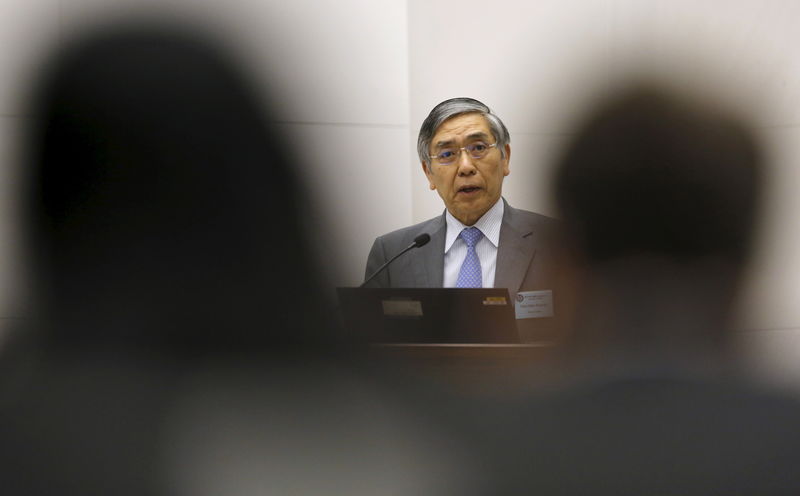By Stanley White
TOKYO (Reuters) - The yen is unlikely to fall further on a real effective exchange rate basis because it is already "very weak", Bank of Japan Governor Haruhiko Kuroda said on Wednesday in remarks that rescued the currency from a near 13-year low against the dollar.
The yen
Speaking to Japanese lawmakers, Kuroda also said the dollar was not bound to rise against the yen if the Federal Reserve raises interest rates as traders may have already priced into the market the possibility of a rate hike.
The BOJ governor's comments playing down the possibility of further yen declines reflect some policymakers' concerns that an excessively weak yen could raise import prices too quickly or become a source of trade friction.
"If you look at the real effective exchange rate, it shows that the yen is already very weak," Kuroda said.
"Even further declines on a real effective exchange rate basis are not likely to happen."
The real effective exchange rate, which is the trade-weighted value of the yen versus other countries after adjustments for prices, shows that the yen is near its weakest level since the early 1973, according to BOJ data.
Since 2013, the yen has fallen largely as a result of the BOJ's money printing strategy aimed at breaking the economy free from a long phase of debilitating deflation.
The BOJ is still in the middle of its massive quantitative easing programme.
Some economists have said the divergence in monetary policy between Japan and the United States will push the dollar higher versus the yen, but Kuroda said there was no certainty.
"It's hard to conclude decisively that the dollar will continue to strengthen further just because the Fed has done tapering and eying raising interest rates," Kuroda told lawmakers in parliament.
Kuroda said it is desirable for the yen to trade in a range that broadly reflects economic fundamentals, but declined to say whether or not the yen is currently in line with fundamentals.
The BOJ chief said he still expected inflation to rise to the central bank's 2 percent target around the first half of fiscal 2016, adding that quantitative easing would continue until inflation stabilised around that level.
Two lawmakers in parliament, one from the ruling Liberal Democratic Party's coalition partner and one from the opposition, said the BOJ did not need to maintain its ultra-easy policy because Japan's economy has improved a lot.

If this view spreads among politicians, it could take some of the pressure off the BOJ to ease policy again if inflation is slow to accelerate later this year.